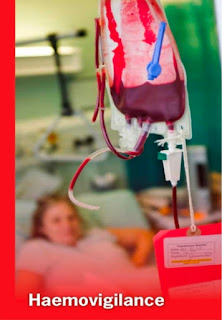HAEMOVIGILANCE
HAEMOVIGILANCE
Introduction
Definition: According to WHO, IHN and ISBT, Haemovigilance is defined as a set of surveillance procedures including the collection of blood and its components till the follow up of its recipients “Intended to collect and assess information on unexpected and undesirable effects resulting from the therapeutic use of labile blood products” and to prevent their occurrence and recurrence.
HEMA- blood (Greek), VIGILANCE- watchful (Latin).
Goals & Objectives
✓ To make safer, efficient and effective blood transfusions.
✓ To demonstrate the safety of the current transfusion system to the general public.
✓ To present the risks and benefits of this therapy.
✓ To ensure that the problems are well-known and are effectively addressed for blood transfusion hazards
✓ Monitor transfusion reactions to serve as forewarning system for emerging complications.
Benefits
✓ Identifying trends in adverse events and reactions, determining core causes, and raising awareness, Haemovigilance systems can help donors and patients stay safer.
✓ Supplying evidence for policy development and revision.
✓ Better your methods.
✓ Directing research in the right direction
✓ A rapid alert and early warning system for emerging risks
✓ Demonstrating and accomplishing improvement
Transfusion-related error hotspots include:
At blood centre where processing and issues are done, OP or IP clinic, ward in prescription request form phlebotomy clinic where sampling for pretransfusion testing is done, during transfer of sample to laboratory, reception, testing, allocation of component, labeling and issue, collection and storage site
Severity assessment
Severity assessment of adverse event in blood transfused recipient is done through imputability scale
✓ Definite
✓ Probable
✓ Possible
✓ Unlikely
✓ Excluded
Consequences of Haemovigilance
Underreporting of adverse events/effects
Lack of understanding or awareness.
Insufficient information on event sheets, and inability to send inquiry results and reports to the health authority.
Transparency in government agencies is lacking.
Lack of regulatory framework for Haemovigilance.
Lack of computerized management system
Manpower shortages
REGULATORY REPORTING
Report any adverse reactions to blood transfusions or the administration of blood products.
Who can report?
Any health care professional (physician, nurses, pharmacist).
Where to report?
Medical colleges, blood banks, hospitals, institutes under Haemovigilance programme of India.
How to report?
REFERENCES
1) Somanth mukharjee, Rituparna maithi ;JOURNAL OF CLINICAL AND DIAGNOSTIC RESEARCH :10(11):EE05-EE09: November 2016.
2) Heuft H.-G.a · Mansouri Taleghani B.;Hemovigilance;karger journal; vol;no.3::may2018
3) Paulo Roberto Juliano Martins,1,2 Raquel Alves Martins,1 Valdirene de Fátima Barbosa,1 Gilberto de Araujo Pereira,1 Hélio Moraes-Souza,1,2 and Sheila Soares Silva,;The importance of hemovigilance in the transmission of infectious diseases;NCBI journal; 35(3): 180–184. 2013.
4) WB Liang, RY Zhang, XF. Ye, J. Sun, WB Tan:The Haemovigilance:the best quality management system of the transfusion chain?:ISBT science series;0.1-6;2018.
5) P. P. Anagha and S. Ponnusankar *;HAEMOVIGILANCE: STEPPING STONE TOWARDS BLOOD SAFETY-INDIAN SCENARIO;INTERNATIONAL JOURNAL OF PHARMACEUTICAL SCIENCES AND RESEARCH;volume 12, issue 6, June 2021.
6) WB. Liang,
7) 1
8) RY. Zhang,
9) 1
10) XF. Ye,
11) 1
12) J. Sun,
13) 1
14) J. Xu
15) 2
16) & WB. Tan
17) 2
18) WB. Liang,
19) 1
20) RY. Zhang,
21) 1
22) XF. Ye,
23) 1
24) J. Sun,
25) 1
26) J. Xu
27) 2
28) & WB. Tan
29) 2
30) WB. Liang,
31) 1
32) RY. Zhang,
33) 1
34) XF. Ye,
35) 1
36) J. Sun,
37) 1
38) J. Xu
39) 2
40) & WB. Tan
41) 2
42) WB. Liang,
43) 1
44) RY. Zhang,
45) 1
46) XF. Ye,
47) 1
48) J. Sun,
49) 1
50) J. Xu
51) 2
52) & WB. Ta
.
AUTHORS
V.Himaja
Pharm D 6th year
Clinosol ID: 009/0121
K. Bhavya Sri
Pharm D 6th year
Clinosol ID: 012/0121





Comments
Got much information from this..